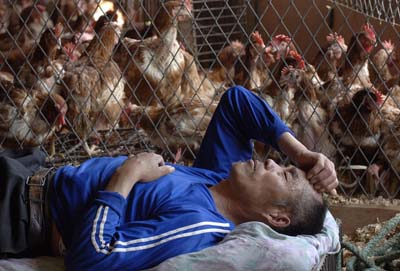China confirms human death from bird flu
(Xinhua)Updated: 2007-03-29 19:25
HEFEI -- China's Ministry of Health has confirmed a 16-year-old boy has died from bird flu in eastern Anhui Province, bringing the number of people in the country who have been killed by the virus to 15.
The boy developed symptoms of pneumonia, fever and muscle aches on March 17. He was admitted to hospital on March 18, the spokesman said.
Tests by the Chinese Center for Disease Control and Prevention on Tuesday confirmed that he had been infected with the H5N1 strain of the bird flu virus.
Local health authorities said they are monitoring those who had close contact with the patient. So far they have not shown symptoms of the disease, and there has been no reported outbreak of the disease among local fowl.
The local authority has not provided information on how the young student may have contracted the disease.
Last December, a 37-year-old farmer in the province was confirmed to have contracted the H5N1 strain of bird flu. The patient surnamed Li was discharged from hospital on January 6 after a full recovery.
According to Anhui health authorities, the Health Ministry has informed the World Health Organization (WHO), health agencies in the two regions of Hong Kong and Macao and Taiwan Province, and some other countries.
China has reported a total of 24 human cases of bird flu since 2003.
On February 28, a 44-year-old woman in southeast China's Fujian Province was confirmed by the health ministry to have contracted the bird flu virus. The patient, surnamed Li who is still being treated in hospital, had eaten chicken together with her family, but neither her husband nor son have fallen ill.
In early March, three wild birds and two head of poultry tested positive for the H5 bird flu virus out of 325 head of poultry and 20 wild birds tested in Fujian province.
The Ministry of Health confirmed last August that the country's first human case of H5N1 bird flu virus occurred in November 2003. The case of a 24-year-old man who died in Beijing in 2003, was initially thought to be a SARS case but was finally confirmed as a human avian influenza case after further laboratory tests.
China's last confirmed human fatality from the H5N1 strain of bird flu was a 62-year-old farmer in northwestern Xinjiang Uygur Autonomous Region. The man fell ill late last June and died on July 12.
Investigations showed the man did not have close contact with any sick or dead poultry, or humans infected with the disease, in the last month of his life.
The H5N1 bird flu virus remains hard for people to catch, but experts fear it may mutate into a form that spreads easily among people, potentially sparking a pandemic.
A batch of chickens who suddenly died in a market on March 1 in Lhasa, capital of southwestern Tibet region, were confirmed to have contracted the H5 virus, according to China's Ministry of Agriculture. But no human cases of bird flu have so far been reported in the region.
According to the WHO figures, as of March 28, the cumulative number of confirmed human cases of avian influenza reported to the WHO was 284 worldwide since 2003, including 169 deaths. The figure does not include China's latest case.
Indonesia recorded its 71st human death from avian influenza after a 28-year-old woman died from the disease on Wednesday in Jakarta, an official with the country's health ministry said on Thursday.
|
||
|
||
|
|

